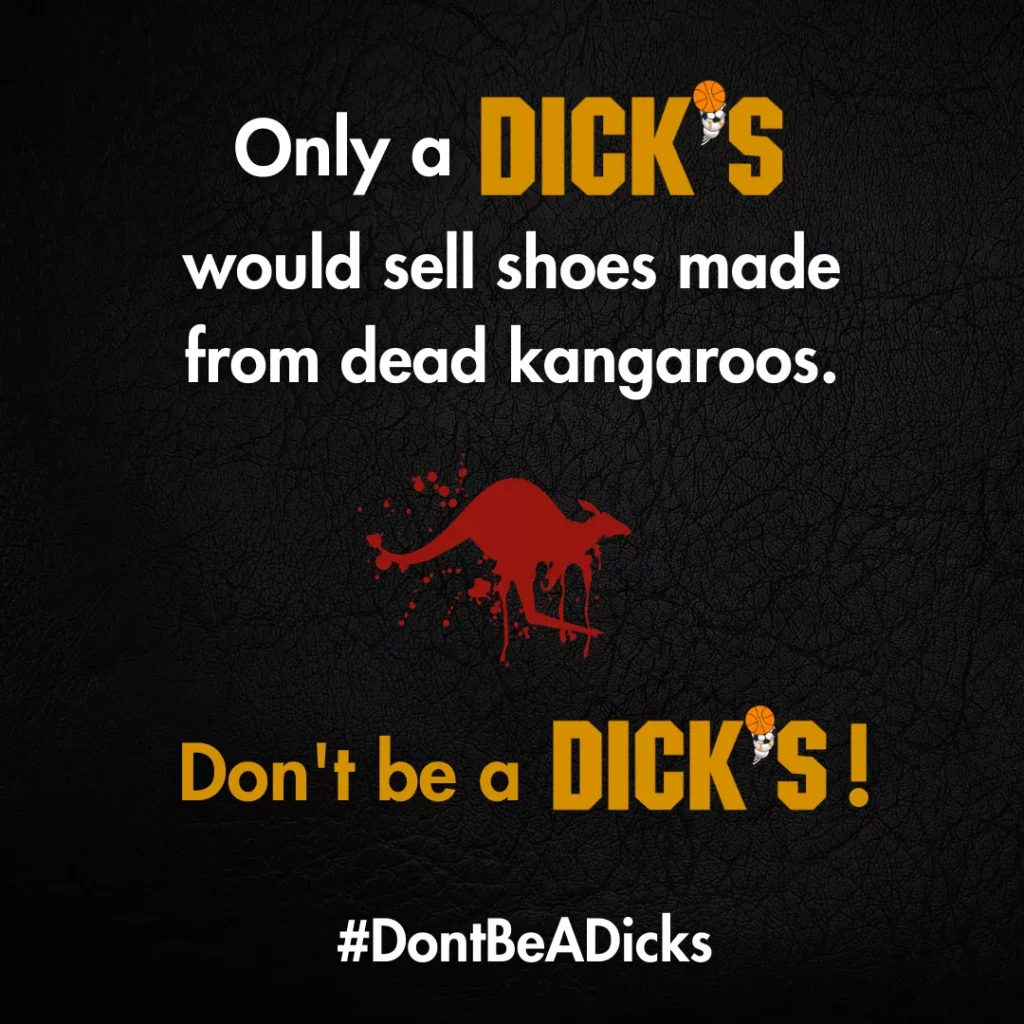Dick’s is still peddling athletic shoes from Adidas, Mizuno and others sourcing skins from kangaroos—even after Nike and Puma announced in 2023 they’d stop the practice.
Pittsburgh, PA — The Center for a Humane Economy is telling Dick’s Sporting Goods to end its role as America’s biggest retailer of kangaroo-based shoes. The animal-welfare group and its partners, which just worked with a bipartisan group of lawmakers in Congress just two weeks ago to introduce federal legislation to ban any sales of kangaroo skins in the United States, is demanding Dick’s stop acting as the key distributor of kangaroo-based soccer cleats from the Germany-based Adidas, the Japanese-based Mizuno, and other companies.
Three years ago, the organization launched its Kangaroos Are Not Shoes campaign, and since then Diadora, Puma, and Nike announced commitments to halt the sale of kangaroo-based shoes. Now the organizations are launching a sub-campaign — “Don’t Be a Dick’s” — to secure a commitment from the biggest sporting goods retailer to stop making kangaroo-based shoes available to customers. The organizations contend that most customers have no idea they are buying kangaroo-based shoes, and have no idea that the animals, including up to 500,000 joeys, are killed in the wild during night-time shooting sprees targeting the animals, mainly for soccer cleats.
“Dick’s should do the right thing and stop acting as a broker for Adidas and other companies that peddle footwear made from kangaroo parts,” said Kate Barton, senior litigator for the Center for a Humane Economy. “Kangaroo-based shoes are a tiny portion of total sales at Dick’s, but these shoe sales exact a devastating toll on kangaroos.”
“Dick’s kangaroo-sourced product line is out of whack with the company’s commitment to be a ‘responsible stewards of our planet,’” said Jennifer Skiff, director of international programs for the Center for a Humane Economy. “It’s cruelty to wildlife in its most extreme form.”

Dick’s Sporting Goods is a publicly traded company with 750 stores nationwide. The hashtag for the campaign is #DontBeADicks. The groups are encouraging people to sign a petition to help persuade Dick’s to stop selling the kangaroo-sourced shoes.
The external pressure over its permissive policies on the trade in wildlife parts comes at a moment of some financial tumult for the Pittsburgh-based company. Dick’s announced today in an earnings call that its profits had dropped 23 percent in the reporting period. Shares quickly fell by about 20 percent in premarket trading.
‘Joeys are still in their pouch’
Each year, about 1.7 million wild kangaroos are gunned down in their native habitats, the groups say. Killing guidelines are deficient and impossible to enforce in the Outback. What’s more, commercial shooters are permitted to kill mother kangaroos even when the joeys are still in their pouch or nursing from their mother. The industry’s commercial code instructs the hunter to then kill the joey by blunt force trauma to the head, which is often accomplished by slamming the joey against the side of a car or other hard surface. Half a million infant kangaroos a year meet this fate, and if the joey scampers off in fear, evading capture by the hunter, they are certain to die from exposure, starvation, dehydration, or predation.
The campaign comes just as the U.S. Congress has turned its attention to the issue. Last month, a key Republicans and Democrats in the U.S. House of Representatives introduced the Kangaroo Protection Act, H.R. 4995, to ban the sale of kangaroo body parts in the United States. A U.S. Senate bill is forthcoming. And a bill that also targets kangaroo skins sales is slated for introduction in the Pennsylvania legislature in Harrisburg.
“In America, we don’t allow this kind of mass commercial slaughter of our native wildlife, and our major U.S. retailers know better than to enable this kind of domestic trade originating in other nations,” added Wayne Pacelle, president of the Center for a Humane Economy.”
In 2021, Animal Wellness Action and the Center, working with two Hollywood filmmakers, released a vivid, widely shared short film on this topic. Using reverse sequencing, the film starts with a soccer player kicking a goal and ends with a kangaroo about to be killed in the Outback, tracing the distinct, connecting steps in between. View the video here.

